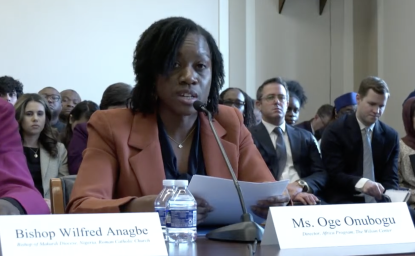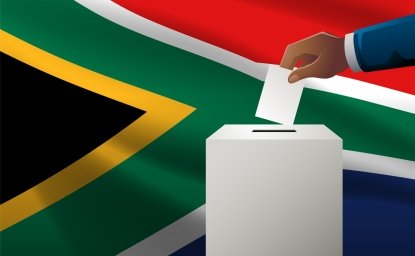From May 26 through May 29, 2015, the Wilson Center’s History and Public Policy Program convened the 2015 Summer Institute on Conducting Archival Research (SICAR). Organized in cooperation with The George Washington University, SICAR provided training to 25 up-and-coming historians, political scientists, and international relations specialists in the theory and practice of archival research.

Students, speakers, and Wilson Center staff of the 2015 Summer Institute on Conducting Archival Research. Photo: E. Pikulski.
Although archival research is an integral part of many academic disciplines, it is virtually never taught at the graduate level. Students are told by their advisors to simply show up at an archive and to figure things out. They are expected to find documents—and quickly—which elucidate and explain the subjects they are examining in their dissertations. For the uninitiated, this can be a time consuming and confusing process. The Summer Institute aimed to fill this critical gap in graduate education and provide an in-depth introduction and overview of archives and archival research.
SICAR’s student participants came from 21 different universities in 9 countries. Their research covered topics spanning the globe, including: US-East Asian relations, historic preservation in the Soviet Union, the history of the Ba’thist regime in Iraq, nuclear disarmament, Chinese foreign policy, decolonization in Kenya, and early communist movements in Southeast Asia.

A four-day intensive workshop, SICAR sessions covered topics such as researching at the US National Archives; working in archives in Asia, Latin America, the Middle East, Europe, and Eurasia; developing archival workflows; and utilizing digital archives. Speakers also introduced how political scientists use archives; how and why documentary volumes such as Foreign Relations of the United States (FRUS) are compiled; and how to transition from researching in an archive to writing and publishing one’s results.
Speakers at SICAR included Thomas S. Blanton (National Security Archive), Stephen Randolph (U.S. Department of State), Thomas Christensen (Princeton University), Hope Harrison (George Washington University), Piero Gleijeses (Johns Hopkins SAIS), Kevin Woods (Institute for Defense Analyses), Christopher Darnton (Catholic University), Maygene Daniels (National Gallery of Art), and Matt Connelly (Columbia University), among many other distinguished experts.
Through SICAR, student participants learned how to prepare, plan, and strategize for archival research. They gained familiarity with research conditions in countries around the world and also received advice on how to put their archival findings to use in dissertation projects and how to approach the grant-writing and publication processes. Student participants also benefited from the collegial environment of SICAR, which provided an important opportunity to network and begin to collaborate with leading experts and fellow graduate students working in related fields and on related topics.
The 2015 Summer Institute on Conducting Archival Research was made possible through the generous support of the Sidney Stern Memorial Trust, The Andrew W. Mellon Foundation, George Washington University’s Institute for European, Russian and Eurasian Studies, and the GW Cold War Group.
The Wilson Center and George Washington University are currently seeking funds in order to continue hosting SICAR on an annual basis. Details about applying for the 2016 Summer Institute will be posted in late 2015.







